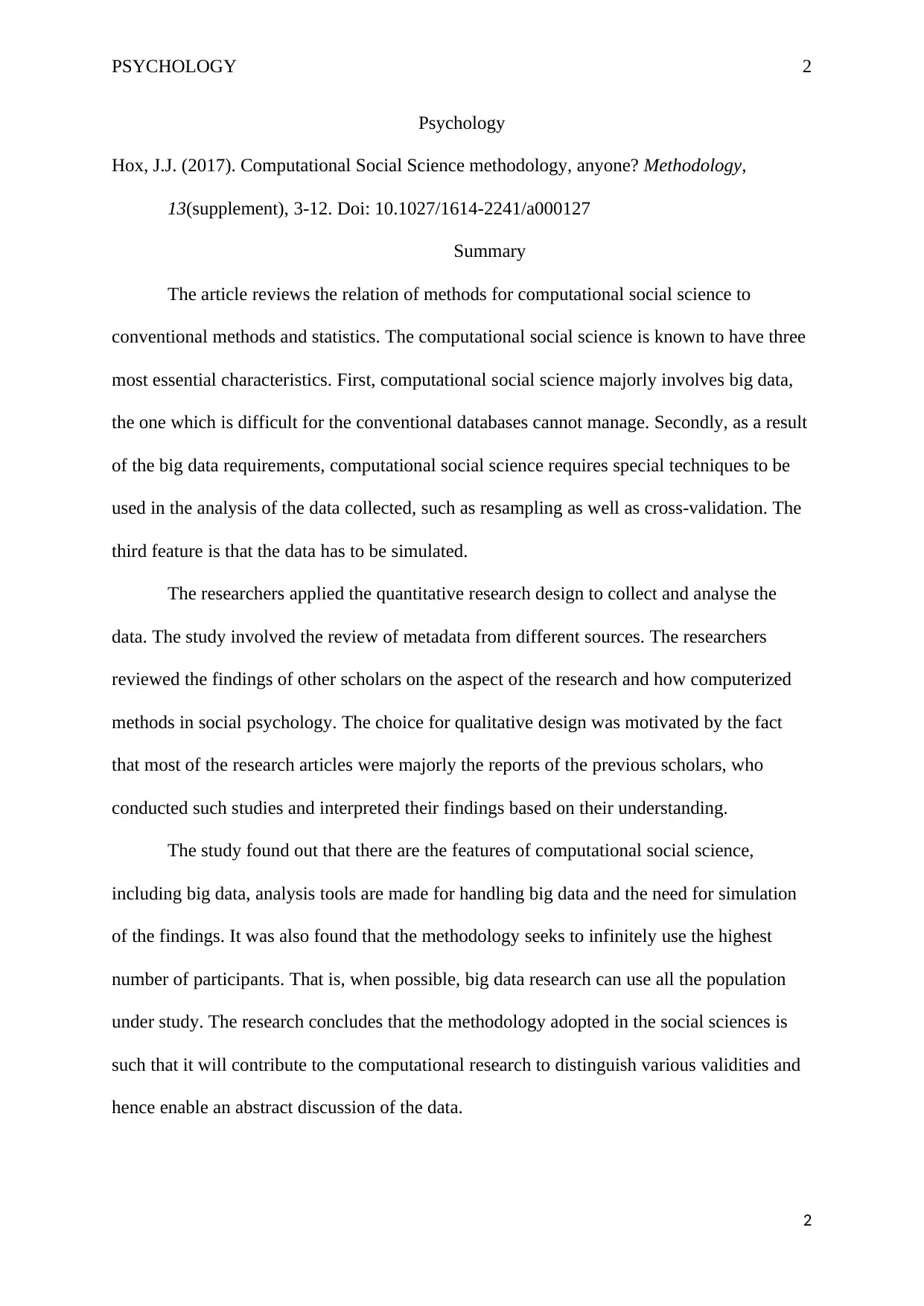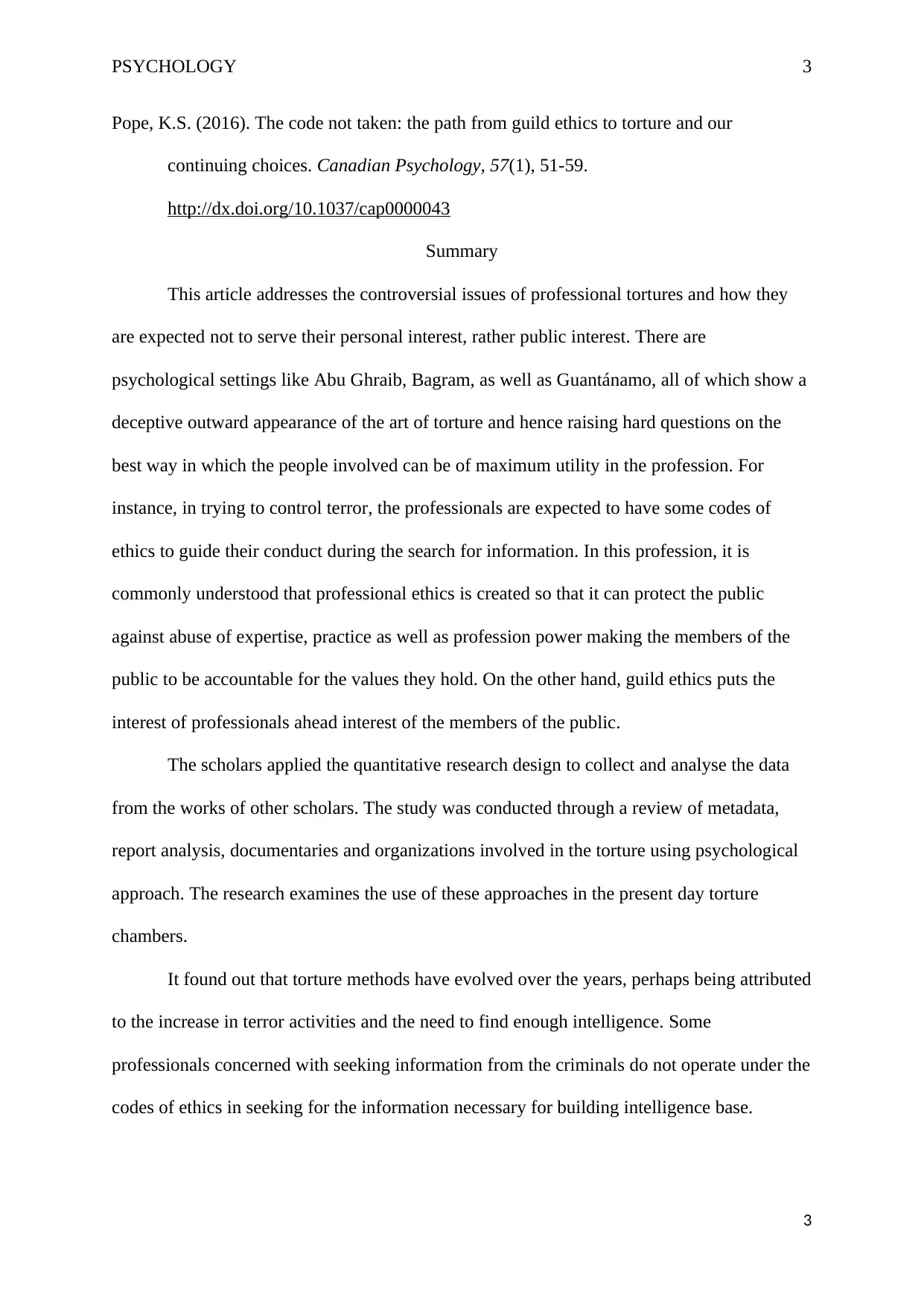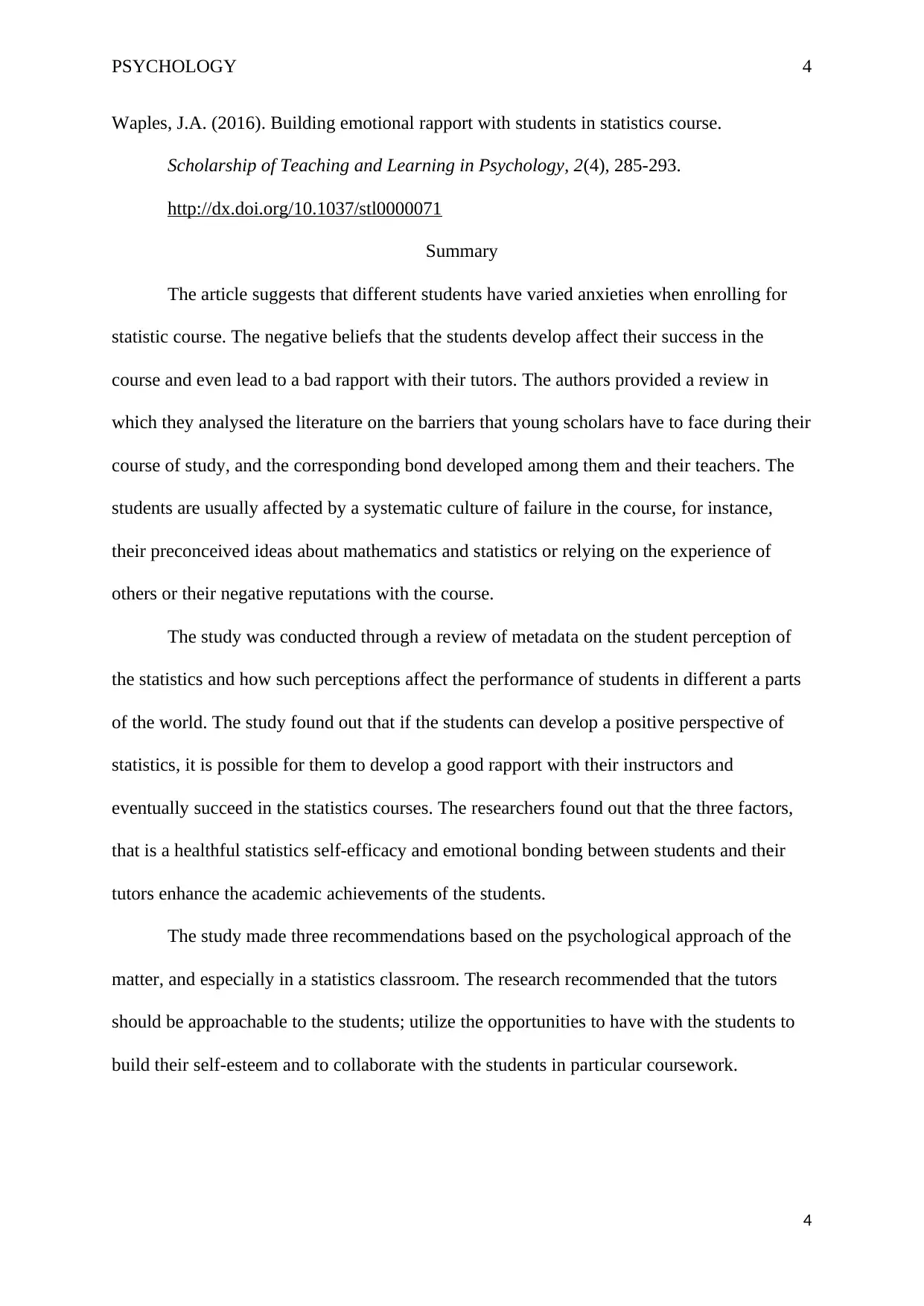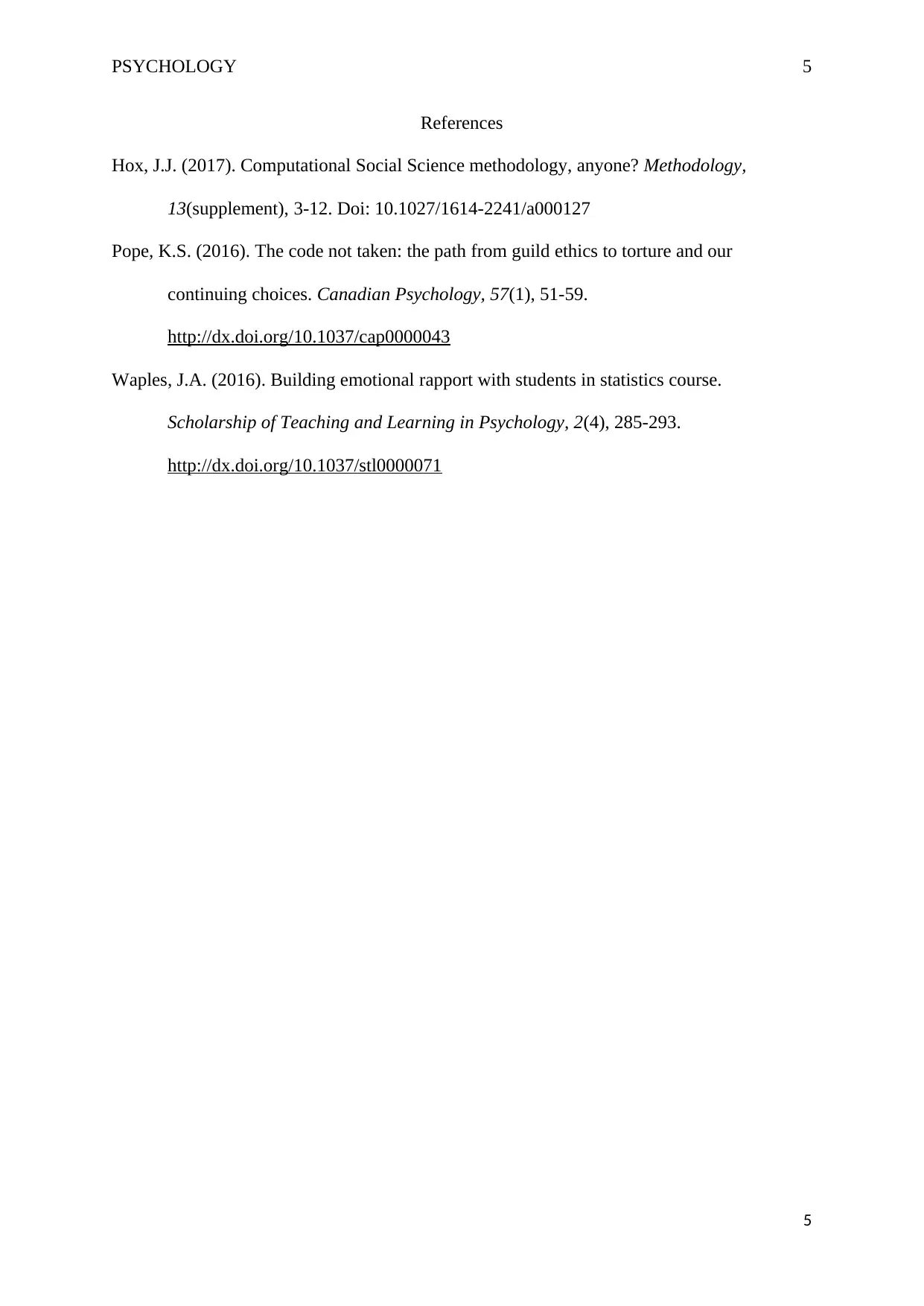In-depth Psychology Article Summaries and Personal Reflections
VerifiedAdded on 2023/06/04
|5
|1070
|261
Journal and Reflective Writing
AI Summary
This assignment presents summaries of three psychology journal articles, focusing on computational social science methodology, professional ethics in the context of torture, and building emotional rapport in statistics courses. Each summary includes the research problem, participant characteristics, experimental methods, key findings, and conclusions. The first article reviews computational social science methods, highlighting big data analysis and simulation. The second addresses ethical issues related to professional involvement in torture, contrasting public interest versus guild ethics. The third explores how to build emotional rapport with students in statistics courses to improve their self-efficacy and academic performance. The assignment reflects on the relevance and implications of each study within the broader field of psychology.

Running head: PSYCHOLOGY 1
Psychology
Name
Institution
Psychology
Name
Institution
Paraphrase This Document
Need a fresh take? Get an instant paraphrase of this document with our AI Paraphraser

PSYCHOLOGY 2
Psychology
Hox, J.J. (2017). Computational Social Science methodology, anyone? Methodology,
13(supplement), 3-12. Doi: 10.1027/1614-2241/a000127
Summary
The article reviews the relation of methods for computational social science to
conventional methods and statistics. The computational social science is known to have three
most essential characteristics. First, computational social science majorly involves big data,
the one which is difficult for the conventional databases cannot manage. Secondly, as a result
of the big data requirements, computational social science requires special techniques to be
used in the analysis of the data collected, such as resampling as well as cross-validation. The
third feature is that the data has to be simulated.
The researchers applied the quantitative research design to collect and analyse the
data. The study involved the review of metadata from different sources. The researchers
reviewed the findings of other scholars on the aspect of the research and how computerized
methods in social psychology. The choice for qualitative design was motivated by the fact
that most of the research articles were majorly the reports of the previous scholars, who
conducted such studies and interpreted their findings based on their understanding.
The study found out that there are the features of computational social science,
including big data, analysis tools are made for handling big data and the need for simulation
of the findings. It was also found that the methodology seeks to infinitely use the highest
number of participants. That is, when possible, big data research can use all the population
under study. The research concludes that the methodology adopted in the social sciences is
such that it will contribute to the computational research to distinguish various validities and
hence enable an abstract discussion of the data.
2
Psychology
Hox, J.J. (2017). Computational Social Science methodology, anyone? Methodology,
13(supplement), 3-12. Doi: 10.1027/1614-2241/a000127
Summary
The article reviews the relation of methods for computational social science to
conventional methods and statistics. The computational social science is known to have three
most essential characteristics. First, computational social science majorly involves big data,
the one which is difficult for the conventional databases cannot manage. Secondly, as a result
of the big data requirements, computational social science requires special techniques to be
used in the analysis of the data collected, such as resampling as well as cross-validation. The
third feature is that the data has to be simulated.
The researchers applied the quantitative research design to collect and analyse the
data. The study involved the review of metadata from different sources. The researchers
reviewed the findings of other scholars on the aspect of the research and how computerized
methods in social psychology. The choice for qualitative design was motivated by the fact
that most of the research articles were majorly the reports of the previous scholars, who
conducted such studies and interpreted their findings based on their understanding.
The study found out that there are the features of computational social science,
including big data, analysis tools are made for handling big data and the need for simulation
of the findings. It was also found that the methodology seeks to infinitely use the highest
number of participants. That is, when possible, big data research can use all the population
under study. The research concludes that the methodology adopted in the social sciences is
such that it will contribute to the computational research to distinguish various validities and
hence enable an abstract discussion of the data.
2

PSYCHOLOGY 3
Pope, K.S. (2016). The code not taken: the path from guild ethics to torture and our
continuing choices. Canadian Psychology, 57(1), 51-59.
http://dx.doi.org/10.1037/cap0000043
Summary
This article addresses the controversial issues of professional tortures and how they
are expected not to serve their personal interest, rather public interest. There are
psychological settings like Abu Ghraib, Bagram, as well as Guantánamo, all of which show a
deceptive outward appearance of the art of torture and hence raising hard questions on the
best way in which the people involved can be of maximum utility in the profession. For
instance, in trying to control terror, the professionals are expected to have some codes of
ethics to guide their conduct during the search for information. In this profession, it is
commonly understood that professional ethics is created so that it can protect the public
against abuse of expertise, practice as well as profession power making the members of the
public to be accountable for the values they hold. On the other hand, guild ethics puts the
interest of professionals ahead interest of the members of the public.
The scholars applied the quantitative research design to collect and analyse the data
from the works of other scholars. The study was conducted through a review of metadata,
report analysis, documentaries and organizations involved in the torture using psychological
approach. The research examines the use of these approaches in the present day torture
chambers.
It found out that torture methods have evolved over the years, perhaps being attributed
to the increase in terror activities and the need to find enough intelligence. Some
professionals concerned with seeking information from the criminals do not operate under the
codes of ethics in seeking for the information necessary for building intelligence base.
3
Pope, K.S. (2016). The code not taken: the path from guild ethics to torture and our
continuing choices. Canadian Psychology, 57(1), 51-59.
http://dx.doi.org/10.1037/cap0000043
Summary
This article addresses the controversial issues of professional tortures and how they
are expected not to serve their personal interest, rather public interest. There are
psychological settings like Abu Ghraib, Bagram, as well as Guantánamo, all of which show a
deceptive outward appearance of the art of torture and hence raising hard questions on the
best way in which the people involved can be of maximum utility in the profession. For
instance, in trying to control terror, the professionals are expected to have some codes of
ethics to guide their conduct during the search for information. In this profession, it is
commonly understood that professional ethics is created so that it can protect the public
against abuse of expertise, practice as well as profession power making the members of the
public to be accountable for the values they hold. On the other hand, guild ethics puts the
interest of professionals ahead interest of the members of the public.
The scholars applied the quantitative research design to collect and analyse the data
from the works of other scholars. The study was conducted through a review of metadata,
report analysis, documentaries and organizations involved in the torture using psychological
approach. The research examines the use of these approaches in the present day torture
chambers.
It found out that torture methods have evolved over the years, perhaps being attributed
to the increase in terror activities and the need to find enough intelligence. Some
professionals concerned with seeking information from the criminals do not operate under the
codes of ethics in seeking for the information necessary for building intelligence base.
3
⊘ This is a preview!⊘
Do you want full access?
Subscribe today to unlock all pages.

Trusted by 1+ million students worldwide

PSYCHOLOGY 4
Waples, J.A. (2016). Building emotional rapport with students in statistics course.
Scholarship of Teaching and Learning in Psychology, 2(4), 285-293.
http://dx.doi.org/10.1037/stl0000071
Summary
The article suggests that different students have varied anxieties when enrolling for
statistic course. The negative beliefs that the students develop affect their success in the
course and even lead to a bad rapport with their tutors. The authors provided a review in
which they analysed the literature on the barriers that young scholars have to face during their
course of study, and the corresponding bond developed among them and their teachers. The
students are usually affected by a systematic culture of failure in the course, for instance,
their preconceived ideas about mathematics and statistics or relying on the experience of
others or their negative reputations with the course.
The study was conducted through a review of metadata on the student perception of
the statistics and how such perceptions affect the performance of students in different a parts
of the world. The study found out that if the students can develop a positive perspective of
statistics, it is possible for them to develop a good rapport with their instructors and
eventually succeed in the statistics courses. The researchers found out that the three factors,
that is a healthful statistics self-efficacy and emotional bonding between students and their
tutors enhance the academic achievements of the students.
The study made three recommendations based on the psychological approach of the
matter, and especially in a statistics classroom. The research recommended that the tutors
should be approachable to the students; utilize the opportunities to have with the students to
build their self-esteem and to collaborate with the students in particular coursework.
4
Waples, J.A. (2016). Building emotional rapport with students in statistics course.
Scholarship of Teaching and Learning in Psychology, 2(4), 285-293.
http://dx.doi.org/10.1037/stl0000071
Summary
The article suggests that different students have varied anxieties when enrolling for
statistic course. The negative beliefs that the students develop affect their success in the
course and even lead to a bad rapport with their tutors. The authors provided a review in
which they analysed the literature on the barriers that young scholars have to face during their
course of study, and the corresponding bond developed among them and their teachers. The
students are usually affected by a systematic culture of failure in the course, for instance,
their preconceived ideas about mathematics and statistics or relying on the experience of
others or their negative reputations with the course.
The study was conducted through a review of metadata on the student perception of
the statistics and how such perceptions affect the performance of students in different a parts
of the world. The study found out that if the students can develop a positive perspective of
statistics, it is possible for them to develop a good rapport with their instructors and
eventually succeed in the statistics courses. The researchers found out that the three factors,
that is a healthful statistics self-efficacy and emotional bonding between students and their
tutors enhance the academic achievements of the students.
The study made three recommendations based on the psychological approach of the
matter, and especially in a statistics classroom. The research recommended that the tutors
should be approachable to the students; utilize the opportunities to have with the students to
build their self-esteem and to collaborate with the students in particular coursework.
4
Paraphrase This Document
Need a fresh take? Get an instant paraphrase of this document with our AI Paraphraser

PSYCHOLOGY 5
References
Hox, J.J. (2017). Computational Social Science methodology, anyone? Methodology,
13(supplement), 3-12. Doi: 10.1027/1614-2241/a000127
Pope, K.S. (2016). The code not taken: the path from guild ethics to torture and our
continuing choices. Canadian Psychology, 57(1), 51-59.
http://dx.doi.org/10.1037/cap0000043
Waples, J.A. (2016). Building emotional rapport with students in statistics course.
Scholarship of Teaching and Learning in Psychology, 2(4), 285-293.
http://dx.doi.org/10.1037/stl0000071
5
References
Hox, J.J. (2017). Computational Social Science methodology, anyone? Methodology,
13(supplement), 3-12. Doi: 10.1027/1614-2241/a000127
Pope, K.S. (2016). The code not taken: the path from guild ethics to torture and our
continuing choices. Canadian Psychology, 57(1), 51-59.
http://dx.doi.org/10.1037/cap0000043
Waples, J.A. (2016). Building emotional rapport with students in statistics course.
Scholarship of Teaching and Learning in Psychology, 2(4), 285-293.
http://dx.doi.org/10.1037/stl0000071
5
1 out of 5
Related Documents
Your All-in-One AI-Powered Toolkit for Academic Success.
+13062052269
info@desklib.com
Available 24*7 on WhatsApp / Email
![[object Object]](/_next/static/media/star-bottom.7253800d.svg)
Unlock your academic potential
Copyright © 2020–2026 A2Z Services. All Rights Reserved. Developed and managed by ZUCOL.





